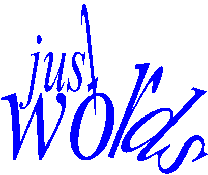

July 2013 edition
All books can be ordered
through AThaiS limited, send requirement by
email athais@justwordslimited.co.uk
or order from
![]()
Click here for details of the Fox Library
or Click for "The poetry of Thomas Albert Fox"
|
October
2012 "2012: Three Score & Ten" This is the collection of the poems Fox wishes kept. It is published without apparatus and dedicated to his son James Innis Edwards who died 19th October 2012, aged 46 years. The dedication is "To: James, recognising his outstanding achievements in the face of very great adversity without complaint ever, 27th September 1966 to 19th October 2012, beloved son and much missed". |
|
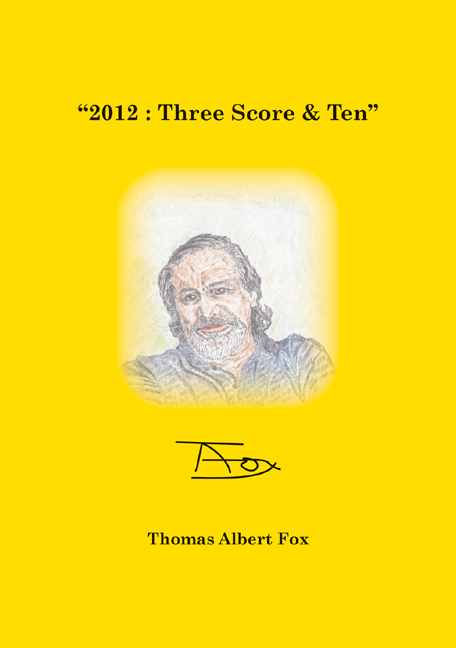
For publication
details
|
"2012: Three Score & Ten" Fox with colophon and drawn out by Siriluck thought it sensible to bring together under single cover, with one exception, all the poetic works of Fox as they have appeared in published form, or in his notebooks to date. The exception is “first utterance of the true thing of it that is”, published in 2007 by justWords Limited, which is of too great a length to be included here (391 pages). With that exception, the poetry herein thus comprehends all his works up to 2012, in their various shapes over the course of his life, until reaching this (hopefully non-terminal) terminus of three score and ten years. It is a Fox with Christopher Hitchens’ “Mortality” in mind and Wordsworthian immortality put aside, unintimated, and set aside too the nostalgia for self as epitomized by dying philosophers failing to ratiocinate being dead as being “somewhere soon to be ‘else’ without him there”, as Bryan Magee has it in his “Intimations of Mortality”. In this is the common inability to imagine beyond the confines of the time and space ‘allusion’ produced by the mathematics of the prescient Jesuit Monseigner Lemaitre (of Einstein’s Theory of Relativity) and all that ‘truth’ ensuing, such that even the god particle, Higg’s Boson, is seen to particularly exist; proving that such a restricted way of thinking has particular utility: that the bits (‘inofatbyon’ everything) it envisions, that it makes from this ‘truthful’ way of thinking, make sense for human solar sensoria confined, as they seem to be, to a particular belief rooted in the Western and now global psyche by the atomism of Democritus and the natural sense such psyches ‘instinct’ in the obvious ‑ that the seeming solidity of the immediate applies in bits to everything, big and small, and to the ever even bigger and the ever even smaller, the macro-cosmological and micro-cosmological, the googlionocal and nanonihiliofit all. Here such ‘instinction’ lies upon the very synaptic edge at which the ratiocinated collides with the religious. Here, entangled at this pointless splace of decoherence, ‘inofatbyon’ the un-appointably ‘splaceless’, the infinite is synonymous with God, and given local habitation from such airy nothing by the poetry of a mathematics versed in the provision of one being Nothing and nothing being One. |
|
December 2009 "songs of nocence" In all fifteen songs of Fox have been transcribed from tunes given of his voice. Of the songs it has not been clear (to Fox) which came first the music or the words. |
|
|
For publication
details |
"songs of
nocence" This large scale work, 740 pages, is described by Fox as an "Autobiography Northwards", which, in the scope of his "plan", sits as the northward looking arm of the four autobiographical works he has in mind to write (should there be time). Thus, this first arm of his autobiography "Northwards" would sit, in due course, with "Westwards" ("Lost in America"), "Eastwards" ("The Charred Lord"), and "Southwards" ("English Wounds"). There is a sense of words in the -wards, their direction and care. As a whole "songs of nocence" is the obverse of Fox's narrative histories, "four utterances of the true thing of it that is", the first of which was published in 2007 (below). The "four utterances" and the "four -wards" form an array from which Fox radiates 'heris' vision of 'cybennial' being. This, and Fox's other published works, bring into view the basic character of 'heris' vision. The remaining works, not only the four autobiographies and the four utterances, but too 'heris' occasional poetry, selected poems, other books and articles in general, and 'heris' ultimate (posthumous) "Collected Poetry" (would) form altogether the foundations of a new (English) vocabulary and grammar enabling communication and persuasion of an 'epistontology' relevant to post-solar-sensorial being, applicable 'inofatbyon' the 'cybennial' epoch. This volume, "songs of nocence", pursues the Foxian idea by means of deploying such another vocabulary and grammar and also by eschewing the normally accepted form of book as book. What is written sits on edge always at risk of falling to bits of humpty-dumptyish incomprehensibility suddenly making no sense in the solar sensorial world in which it is found. This overturns the assumption that in writing one (a book) it is necessary to accept dictation by the precedents set, bound and glued by the evolution of solar sensorial edicts promulgated and sustained by apparent certainties set by an all encompassing mediasphere manufactured in the confusion and profusion of perspectives artificially differentiated and shuffled under those ubiquitous conveniences: the "modern" and "postmodern". In this autobiography Fox continues his destruction of the given forms and fixtures of religions, art and history which permeate and habituate these perspectives essential to and necessarily produced 'inofatbyon' that solar sensorium said by Newton to be human being in cohabitation with the mind of God, but relegated by Fox to an human, solipsistic backroom 'wherinofatbyon' it becomes merely passing junk. It is to the disposal of this junk and its room that Fox's work is turned. Beside the door to this junk-room sit the songs themselves and their singer posing as a 'cybennial' busker. |
|
May 2008 "Intercourse" In which the degeneration of a word, this one, is challenged by the scope of the poetry it comprehends and communicates producing a purity of preversion by ancestry of verse. |
|
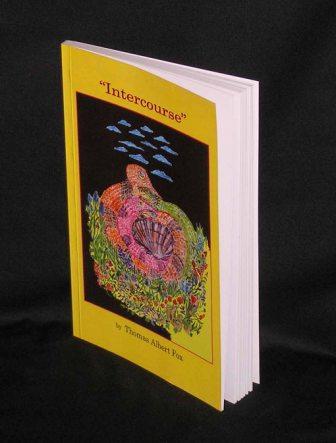
For publication
details |
This 115 page selection of poems from Fox's overall collection reflects the multifarious nature of human intercourse. "Intercourse" is a carefully chosen title intending to convey not simply sexual intercourse, as most readily understood in these somewhat unsubtle days, but to embrace the broader and deeper Latin root (intercurrere) which gives "running between"; the poems are runnings between people intimating the infiniteness of the multifarious yet inescapably self-consuming nature of human intercourse. Such infiniteness is deliberately complicated by allusion to the insatiability of human need to satisfy (it)self as expressed by John Donne in his poem "Lovers' Infiniteness", 1633 which devises such nature as ineluctably engaged in perpetual 'strifing' to become always "one another's All". |
|
Thomas Albert
Fox's |
|
|
For publication
details |
"first utterance of the
true thing of it that is"
the beginning of history This 392 page poem is uttered in a form that eschews the key parameters of the English language as literary instrument, this is to say (literally) as a written language. The poem reverts English to a purely oral form through the eye of its ultimate paradox: writing. As in Fox's expression of the co-existential paradox in his poem "Deor", this poem cannot both 'be' oral and literary (written). Yet, in the attempt to be oral and inevitably 'being' both, Fox 'is' reverting English to a facsimile or record of its original utterance. This not to de-artefact the book as such, but, by re-formatting its traditional parameters, it is to eschew the normative implications that necessarily follow from the perceptual framework erected by the physical and literary conventions that come with the established English book form as an object to hand. The cover illustration shows the living nature of each written character making up the word "Latin". These characters have a life of their own both preceding and succeeding, as it were, their various possible formation into written words and, in the case of these particular characters, representing the dismembering of the Latin dominion of 5th and 6th century Britain and eventual re-membering in the English glottis. Reference to the notes on Alfred Smith further explicate the utterance concept. |
|
Thomas Albert
Fox's |
|
|
For publication
details |
"Deor: dear heart
dear one"
Such rough drafting is shown of the development of "Core rite" which is also a fifteen stanza poem, but of an altogether different form than "Deor". It reflects a childhood experience in post second world war Britain when rationing of most things was normal and apple cores were at a premium. The garden of Eden and the language of that first apple figure in the poem. Indeed, at its core it is a consumption dearly won, as if by right. |
|
Also available: Thomas Albert Fox's love story of modern times Edited by Terry Edwards |
|
|
For publication
details |
A three stanza marriage song in the metaphysical style of the 17th century English poet John Donne written to celebrate the Wedding of Fox's friends George Mihov and Malvina Kotorova. The song leads Fox and his editor to re-appraise the moral philosophy which informed Donne's life as we see it through his extant written work, particularly his own Epithalamions. The younger Donne is seen as driven by a passionate piety struggling against his natural appetite for sex and his need for love. Fox distinguishes in Donne's poetry a paradoxically severe distinction between love and sex while at the same time both needs give expression to states of innocent being which are religiously joined. Fox finds that Donne seeks to access a state of metaphysical innocence through sex and that he is able to express this state through his use of a poetic technique which was interestingly dubbed by Dryden as "metaphysical", a term perpetuated by Dr Johnson and promoted by T S Eliot such that it now lies as a central term in English literary criticism (indeed, lies in wait to trip up the unwary). There are three sonnet verses each embracing the loving relationship between George and Malvina upon which their marriage is made. Fox intimates too the cross-cultural stretch between England and Bulgaria. The book contains the full text of Fox's "A Veiled Threat: Dance of the Seven Sonnets", and "Lands of Hope Their Story". |
Also available: |
|
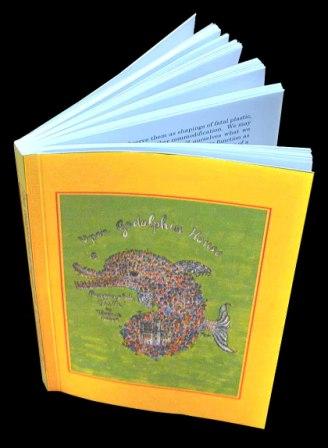
For publication details |
"Upon Godolphin House
This 43 stanza poem in the style
of Andrew Marvell's 17th century poem "Upon Appleton House"
celebrates the story of two Cornish houses that date back to medieval times and
even to pre-historical settlement.
At the heart of the poem are three love stories set amongst the adventures, the
deadly politics, the entrepreneurship,
and the agony of the British Civil War and its affect on the families involved
in the houses.
Essentially, this work of Fox is in homage to the extraordinary poetry of Andrew
Marvell.
Yet, it takes Marvell's work onward into another New World than that which was
known to him and
under exploration & exploitation in the 17th century. Fox creates a
strange model whereby
he 'illudes' Marvell such that allusion creates an illusion that the space
between Fox and
the 'then' of Marvell is compressed into one being. It is to the being-one
that Fox works. |
| Also available: Thomas Albert Fox's Golden Jubilee Poem Edited by Terry Edwards |
|
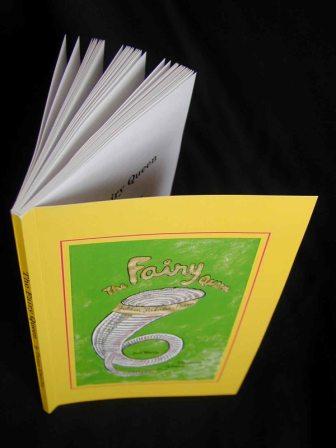
For publication details |
|
|
Also
Available: |
|
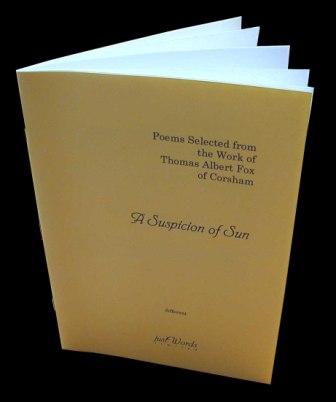
For publication details |
A small selection of a dozen poems made in 1996 from the unpublished collected work then comprising approximately 500 poems. The selection is made to illustrate the range of Fox's short poems at that time. It is of interest in providing an idea of the departure point for some of his later work. |
|
Works by Fox's Editor: Terry
Edwards. Terry Edwards left school at sixteen to serve an electronics apprenticeship in the Royal Air Force. He served a twelve year engagement, travelling to and working in many parts of Britain, the Near and Middle East. On completing his engagement in 1972 he took a State Scholarship to read English Literature & Philosophy honours at the University of Bristol, while also working in the building industry. He joined the Union of Construction Allied Trades and Technicians (UCATT) at this time and served in Branch, Regional and National lay official positions. After Bristol University he took an MSc in Management at the University of Bath and in 1982 also took a Master of Education degree specializing in Curriculum studies. In 1978 he was appointed to lecture in Management at the City of Bath Technical College, where he also served as Branch Chairman and County Negotiator for the lecturers' union NATFHE. He also served as the local education officer for the British Institute of Management and as a Bath City Councillor and Deputy Leader of his political group. He has undertaken many practical consultancies to industry and formulated, developed and worked widely within several major EU projects, managing two large projects in Civil Engineering and in the Arts centred on Romania and involving seven EU countries. He has presented a major Highways proposal at the World Bank in Washington and to several foreign governments. He has had published two full length books one on education and another on management training, together with two major refereed papers. He served in the City Bath College in several capacities leaving in 1993 as a Deputy Principal to set up his own micro-companies justWords Ltd and AThaiS Ltd with his partner Khun Siriluck Kedseemake. Terry Edwards has known Fox for many years. |
|
|
"The Youth Training Scheme: ISBN 0 905273 96 6
Available secondhand |
Published by The Falmer Press, Taylor Francis in 1984, 180 pages. The first serious attempt to grapple with the curricular implications of the British Youth Training Scheme and with questions about the organization, administration and manpower policy objectives of the scheme. The book develops an organizational perspective to the analysis of curriculum and attempts a new definition. The meaning of the word curriculum is discussed and a new definition develops through which the curricular implications of the Youth Training Scheme are drawn out. A labour market analysis is used to link youth unemployment, national manpower policy and the provision of education and training for 16-19 year olds in the English education system. There is emphasis in the book on the application of behaviourial theory to any curriculum (as defined in organizational terms). This is to say, theory to do with the behaviour of organizations and to do with the behaviour of people in organizations. |
| "Goodwhistle PLC" ISBN 0 7131 3578 6 Out of print & not available except from the author |
Published by Edward Arnold in 1987, 215 pages. A working organization for the practice of management and supervision skills. |
| "Community
learning with an "Intelligent" College: a new way to learn" ISSN 0309 0590 |
Published by MCB University Press: "Journal of European Industrial Training", Volume 20 Number One 1996, p4-15; a refereed journal. |
| "Worldtel: World Thai Expert Link" ISSN 1066 2243 |
(With Siriluck Kedseemake) Published by MCB University Press: "Journal of Internet Research", Volume 7, Number One, 1997, p32-43; a refereed journal. |
| Numerous other articles and papers. | Details on request. |
| Thomas Albert Fox* | Link to the poetry of Thomas Albert Fox and the Access page to the Fox Library which contains the full, extant listing of Fox's collected poetry. You can view the library structure and example poems from the seven volumes of Fox's work. |
| Alfred Smith* | "utterance of the true thing of it that is". This is a work being made from an original smelt of ore mind in the long wounds of Wessex. |
| Albert Monostone* | Monostone tentatively draws together his research into the philosophy and nature of space in a major paper entitled, "Dear Zeno, about God's Sensorium"... |
| Siriluck Kedseemake* | Link to examples of her series of Scottish paintings and diaries, her Thai drawings and paintings, and Thai kitchen garden in England. |
| Katie Areeya* | Link to examples of
work by a talented young artist who has illustrated some of the poems of Thomas Albert Fox. |
| Sarah Arunee* | Link to her famous "Sand Goddess" painting as chosen by Thomas Albert Fox to illustrate his song. |
| Oddmeants | For
"jingles" made to measure; the justWords Poetry Prize; holidays
in Scotland; The justWords Millenium Poem; |
| The BHA |
The British
Humanist Association |
| National Secular Society |
The leading British pressure group speaking out for the rights of atheists, agnostics and other non-believers. |
Back to The Poetry of Thomas Albert Fox
Back to Home